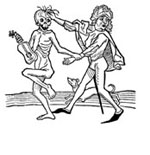
A Thomistic Vision of Man’s Final End
VITAL WORKS RECONSIDERED, #38
The Divine Comedy. By Dante Alighieri.
In his latest novel, Inferno, author Dan Brown borrows liberally from (one might even say distorts) Dante’s Divine Comedy. Brown’s protagonist, Prof. Robert Langdon, must decipher codes found in Dante’s epic poem in order to stop the release of a plague as the answer to the “problem of overpopulation.” What is quite clear when one reads Dante’s journey through the afterlife is that he too was concerned with plagues, but those of a moral rather than a medical kind. In fact, it is not just the innovative use of terza rima that makes Dante’s epic so remarkable, it is the imaginative manner in which he depicts man’s journey toward his ultimate end. The philosophical foundation upon which Dante built the Divine Comedy was, however, far from a product of its author’s imagination. Rather, Dante relied heavily on the philosophical vision of St. Thomas Aquinas in order to construct his epic. Indeed, the Divine Comedy has been commonly referred to as the “Summa in verse.”
It is evident, for example, that Dante was familiar with Aquinas’s treatise on happiness, found in the first twenty-one questions of Parts I-II of the Angelic Doctor’s Summa Theologiae (ST) . Therein, St. Thomas taught that the pursuit of happiness is not something we choose to engage in but something we are designed to engage in: Man, he says, “is incapable of not wanting to be happy” ( ST, I-II, q.5, a.4, ad 2). Dante is told something similar by Virgil, who says that “the soul at birth…will move towards anything that pleases it” (Purgatorio, Canto XVIII, lines 19-21).
Like St. Thomas, Dante believes that true happiness consists in the beatific vision, whereby the intellect is brought to act through the knowledge of God when we “see Him as He really is” (1 Jn. 3:2). This is why, as Dante leaves the Earthly Paradise at the top of Mount Purgatory and prepares to enter Heaven, he tells Beatrice that the “intellect draws near its goal” (Paradiso, Canto I, line 7).
Both Dante and St. Thomas recognize that many disagree as to what true happiness actually consists in. To address this question, Aquinas examines some of the alternatives put forth as the source of happiness. Dante’s vision is a powerful complement to St. Thomas’s thought in that it puts flesh to each of the alternatives. Dante shows what those who realize their error might do to get back on the right path, and what happens to those who remain in error permanently.
You May Also Enjoy
The Origins of Totalitarianism. By Hannah Arendt.
Hannah Arendt’s The Origins of Totalitarianism was published…
President Johnson was seduced by his macho superpatriotism into the morass of Vietnam, and so the war against poverty was lost too.
The classics could teach what virtue is, but they could not figure out a way to practice it. The Christian would argue for the help of grace. But even with grace things go wrong.

